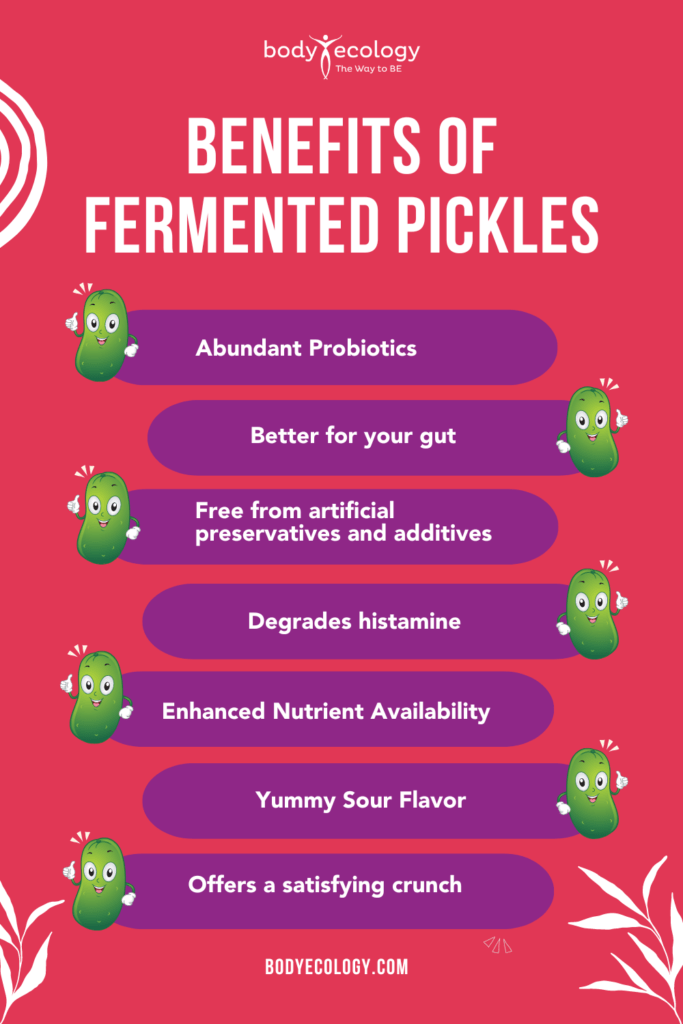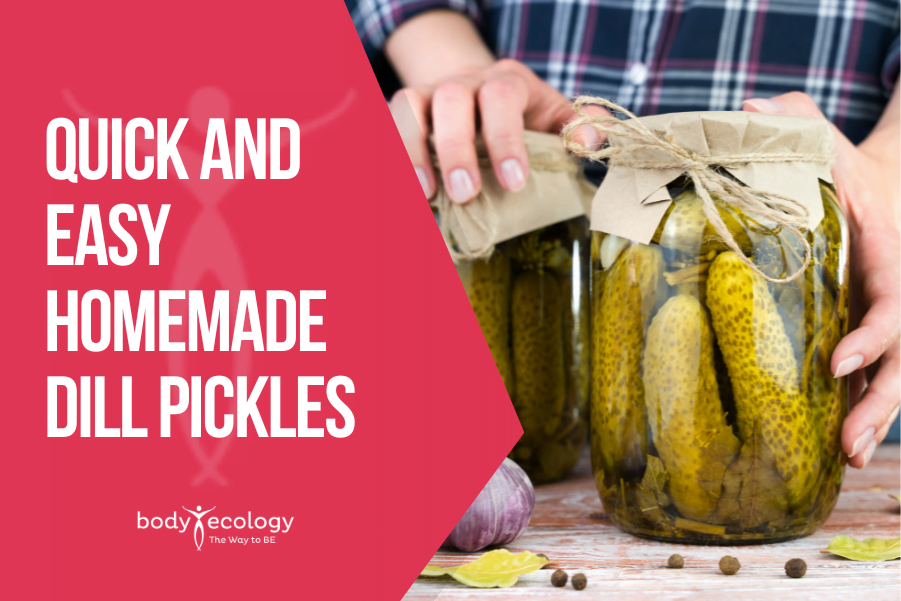Quick and Easy Homemade Dill Pickles
Who doesn’t love a pickle? You either do…or you don’t. But…
Fermented dill pickles made using Body Ecology’s culture starter have numerous benefits. We all know (or should know) fermented foods like dill pickles are rich in probiotics, which are beneficial bacteria that promote a healthy gut. Probiotics aid in digestion, support the immune system, and contribute to overall well-being.
A starter ensures the presence of specific strains of beneficial bacteria that are known to have protective effects on the gut. Not only that, fermented pickles are a great source of vitamins and minerals. During the fermentation process, the pickles become more nutritious as their nutrient content becomes more bioavailable. This means that your body can absorb and utilize the vitamins and minerals more effectively.
Do you love the tangy flavor explosion of a dill pickle? The fermentation process intensifies the flavors of the dill, garlic, and other seasonings, resulting in a unique taste that can enhance your culinary adventures. They also provide a satisfying crunch that can be a delightful addition to various dishes or simply enjoyed on their own.
Feel good about your homemade dill pickles as they have more beneficial lactobacillus and other beneficial microbes. Unlike the pickles you find sitting unrefrigerated on shelves in your supermarket, homemade pickles are free from artificial preservatives, white vinegar and additives. So gather some fresh farm stand cucumbers, the kids and start fermenting your own probiotic-rich, delicious dill pickles!
Benefits of Fermented Pickles
- Abundant Probiotics: Fermented pickles are a rich source of beneficial bacteria, known as probiotics, which play a vital role in supporting a healthy gut. The probiotics in a pickle aid digestion, enhance nutrient absorption, and bolster the immune system, providing a solid foundation for optimal wellness.
- If you use Body Ecology’s culture starter—with billions of L. plantarum bacteria—the finished product will be even better for your gut than pickles made without a starter. Research shows that starters are the way to increase the potency and also the diversity.
- Homemade pickles—using Body Ecology’s culture starter—have more abundance and more diversity. You’ll also know that they are free from artificial preservatives and additives commonly found in store-bought alternatives. Homemade pickles offer a healthier option.
- L. plantarum degrades histamine and—along with strains of Bifidus and bacillus—does not cause a histamine reaction.
- Enhanced Nutrient Availability: During the fermentation process, the nutrient content of pickles becomes more bioavailable. This means that your body can absorb and utilize the vitamins, minerals, and other essential nutrients found in pickles more effectively.
- Yummy Sour Flavor: Sweet, sour, bitter, salty, pungent – these are the flavors our body loves and needs. Sour stimulates peristalsis. Fermentation infuses dill pickles with a delightful tangy, sour taste. The fermentation process intensifies the flavors of the accompanying spices and herbs.
- Fermented pickles offer a satisfying crunch, making them a perfect addition to sandwiches, salads, or as a flavorful snack on their own.

Dill Pickles – Super Quick and Easy Recipe
Check this quick and easy recipe for homemade dill pickles. In just a few simple steps, you can create a jar of delicious pickles.
Ingredients:
8 small, unpeeled pickling cucumbers, quartered lengthwise
4 cloves of garlic
8 pearl onions, sliced in half
4 sprigs of fresh dill
1 tsp coriander seeds
½ tsp mustard seeds
½ tsp whole peppercorns
4 cups of water
2 tablespoon coarse, gray Celtic sea salt
2 thick slice from a large onion
1 packet of the BE culture starter
Directions:
- Pack cucumber slices, garlic and pearl onions tightly into a 1-quart glass jar.
- Add the herbs and spices on top.
- Combine the water, culture starter, and sea salt to make a brine.
- Pour brine into the jar, leaving about an inch of space.
- Place the thick onion slice on top to completely submerge the ingredients in the jar. You can also use rolled up cabbage or kale leaves.
- Seal the jar and let pickles sit at room temperature for 3 days. If after 3 days the pickles are not yet to your taste, let them sit for another day or two. You still want them to have some crunch. Refrigerate when they’re the way you like them.
References
Morengo, K. 2019. What are the benefits of pickles? Medical News Today. 22/07/2023. https://www.medicalnewstoday.com/articles/325124
Nelson, A. 2021. What Pickles Can Do for Your Health. WebMD. 22/07/2023. https://www.webmd.com/food-recipes/health-benefits-pickles









